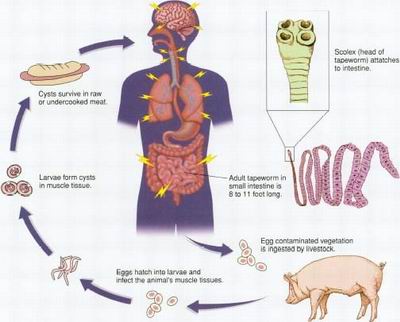Tapeworm Infection Causes, Symptoms, Diagnosis and Treatment

What Is Tapeworm Infection?
Tapeworm infection is the infestation of the digestive tract by a species of parasitic cestodal flatworm called tapeworms.
If one ingests tapeworm eggs, they can migrate outside the intestines and form larval cysts in body tissues and organs (invasive infection).
If one ingests tapeworm larvae, however, they develop into adult tapeworms in the intestines (intestinal infection).
Causes Of Tapeworm Infection:
There are two major causes of tapeworm infections.
- Ingestion of eggs
Eating food or drink contaminated with feces from either a person or animal with tapeworm infection leads to the acquirement of the infection.
Once inside the intestines, the ingested eggs develop into larvae. The larvae then become mobile, forming cysts in other tissues after migrating.
- Ingestion of larvae cysts in meat or muscle tissue.
Eating raw or uncooked meat of an animal infected with tapeworm infection can lead to the ingestion of tapeworm larvae, which then develops into adult tapeworm in the intestines.
Risk Factors Of Tapeworm Infection:
The following risk factors increase the probability of acquiring the infection:
- General lack of hygiene
Infrequent washing of hands increases the risk of transferring infection into the mouth
- Working with or exposure to animals
This is especially the case in areas where feces are not disposed of effectively.
- Traveling to or living in certain parts of the world
Travelling or living in countries with poor sanitation practices increases the likelihood of getting infected.
Symptoms Of Tapeworm Infection:
Although many people do not experience any sort of symptoms, those who do, their symptoms depends on the type of infection they have.
- Intestinal infection:
- Nausea
- Weakness
- Loss of appetite
- Abdominal pain
- Diarrhea
- Weight loss and inadequate absorption of nutrients from food
- Invasive infection:
- Cystic masses or lumps
- Allergic reactions to the larvae
- Bacterial infections
- Neurological signs and symptoms, including seizures
- Fever
Diagnosis Of Tapeworm Infection:
In order to diagnose tapeworm infection, the concerned doctor may rely on the following:
- Stool sample analysis
- Blood test
- Imaging exam
- CT
- MRI scans
- X-rays
- ultrasounds of cysts
- Organ tests
Treatment Of Tapeworm Infection:
There are different types of treatment available depending upon the type of tapeworm infection an individual has.
- Treatment for intestinal infection:
The most common treatment for tapeworm infection involves oral medications that are toxic to the adult tapeworm, including:
- Praziquantel (Biltricide)
- Albendazole (Albenza)
- Nitazoxanide (Alinia)
- Treatment for invasive infection:
Treating an invasive infection depends on the location and effects of the infection.
- Anthelmintic drugs
- Anti-inflammatory therapy
- Anti-epileptic therapy.
- Shunt placement.
- Surgery
By : Natural Health News




